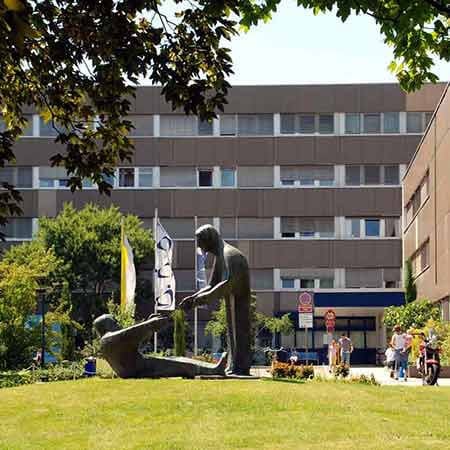Hospitals for Lung Cancer Treatment in Germany
Each hospital in this list meets Booking Health’s strict international standards: at least 250 surgeries per year, ISO‑certified quality management, and documented survival outcomes. Our medical board then ranks the clinics by clinical expertise, technology, and patient‑satisfaction scores.

The ViDia Hospital Karlsruhe is a modern medical facility with a rich history and traditions. The medical complex is an academic hospital of the University of Freiburg, granting patients access to advanced university medicine and the very latest therapeutic developments. The hospital first opened its doors in 1851 and, since the
Diagnosis of lung cancer
Price from:
7547.22
Go to the program Treatment of lung cancer with embolization of bleeding vesseles
Price from:
9010.9
Go to the program Thoracotomy by lung cancer with segmental resection
Price from:
23958.29
Go to the program Treatment of lung cancer by radiation therapy
Price from:
24241.96
Go to the program Treatment of lung cancer with chemotherapy
Price from:
Go to the program
8492.33
7692.33 Treatment of lung cancer with lobectomy and extended pneumonectomy
Price from:
32490.6
Go to the program Treatment of neuroendocrine tumor (NET) of the lung with chemotherapy
Price from:
7702.77
Go to the program 
According to Focus magazine, the University Hospital Heidelberg ranks among the top five hospitals in Germany! The hospital is one of the most advanced and reputable medical institutions not only in Germany, but throughout Europe. There are more than 43 specialized departments and 13 medical institutes, which cover all fields of







Diagnosis of lung cancer
Price from:
0
Go to the program Treatment of lung cancer with embolization of bleeding vesseles
Price from:
0
Go to the program Thoracotomy by lung cancer with segmental resection
Price from:
0
Go to the program Treatment of lung cancer by radiation therapy
Price from:
0
Go to the program Treatment of lung cancer with chemotherapy
Price from:
0
Go to the program Treatment of lung cancer with embolization or chemoembolization
Price from:
0
Go to the program Treatment of lung cancer with lobectomy and extended pneumonectomy
Price from:
0
Go to the program Treatment of lung cancer with proton therapy
Price from:
0
Go to the program Treatment of neuroendocrine tumor (NET) of the lung with chemotherapy
Price from:
0
Go to the program Treatment of neuroendocrine tumor (NET) of the lung with embolization or chemoembolization
Price from:
0
Go to the program Treatment of neuroendocrine tumor (NET) of the lung with Lutetium-177-DOTATATE
Price from:
0
Go to the program 
According to the prestigious Focus magazine, the University Hospital RWTH Aachen ranks among the top German hospitals! As a maximum care university medical facility, the hospital guarantees patients first-class medical services combined with a respectful and human attitude. The hospital integrates all the modern options for the 









Diagnosis of lung cancer
Price from:
8800.02
Go to the program Treatment of lung cancer with embolization of bleeding vesseles
Price from:
10651.03
Go to the program Thoracotomy by lung cancer with segmental resection
Price from:
29004.99
Go to the program Treatment of lung cancer by radiation therapy
Price from:
31326.54
Go to the program Treatment of lung cancer with chemotherapy
Price from:
8984.8
Go to the program Treatment of lung cancer with embolization or chemoembolization
Price from:
31341.16
Go to the program Treatment of lung cancer with lobectomy and extended pneumonectomy
Price from:
39271.38
Go to the program Treatment of neuroendocrine tumor (NET) of the lung with chemotherapy
Price from:
8801.06
Go to the program Treatment of neuroendocrine tumor (NET) of the lung with embolization or chemoembolization
Price from:
31006.03
Go to the program Treatment of neuroendocrine tumor (NET) of the lung with Lutetium-177-DOTATATE
Price from:
17787.21
Go to the program 

